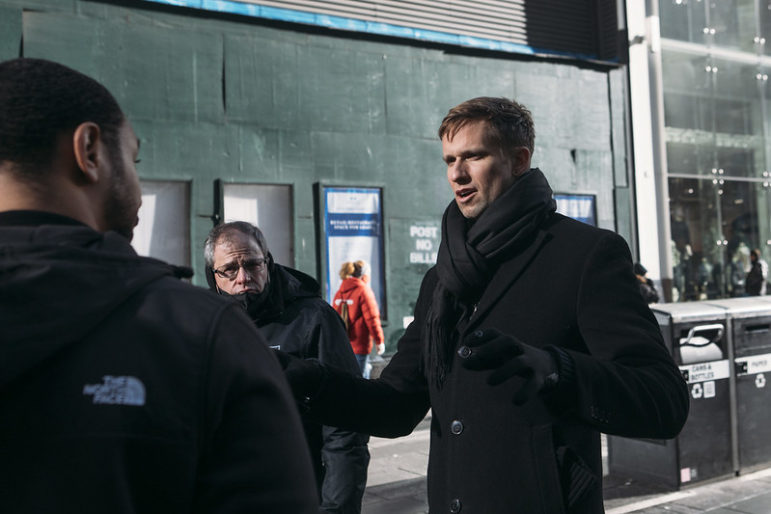“The failure that we’re experiencing is the result of decades of disinvestment of mental health services,” Manhattan Councilmember Erik Bottcher, who represents Greenwich Village, Chelsea and Hell’s Kitchen, said during an appearance on WBAI’s City Watch this week.

Emil Cohen/NYC Council Media Unit
Manhattan Councilman Erik Bottcher during a tour of his district in Times Square.
On the campaign trail, Manhattan Councilmember Erik Bottcher drew on his personal experiences to bring attention to what he termed the “shadow pandemic” of unmet mental health needs. Bottcher, who was admitted into a psychiatric rehab facility at 15, urged the city to direct resources to support people with serious mental illness who have few options beyond a brief stay in an emergency room.
Now in office, Bottcher has renewed calls for the city and state to increase the number of crisis stabilization centers, also known as medical respite beds, for people with mental illness who need intensive treatment—especially if they are also experiencing homelessness.
“People entering emergency rooms during a mental health crisis, they are often discharged sometimes in hours, sometimes a day later and are back in the streets or shelters,” Bottcher said Sunday during an appearance on WBAI’s City Watch. “One thing we have to do is create more medical respite beds to replace an existing gap in the continuum of care.”
Starting in the 1960s, New York began to close large psychiatric facilities, where people with mental illness were locked away and frequently mistreated. Bottcher said those closures did not coincide with sufficient services for people with mental illness who could otherwise live independently and thrive with support and medication.
“The failure that we’re experiencing is the result of decades of disinvestment of mental health services,” he said. “The idea was to replace those hospitals with community-based programs where people could live in the community and receive outpatient services.”
“Unfortunately, we never really invested adequately in those services,” he added.
New York has cut the number of inpatient beds for people whose mental health has deteriorated—an experience that mental health professionals term “decompensation.” A report by the social service organization BronxWorks, first reported by the New York Times, details how hospitals discharge people in need due to limited treatment options and expedience.
“They’re not sick enough to stay in the hospital, but they’re not well enough to release,” Bottcher said. “They need a place to recuperate, receive treatment, mental health services, substance abuse services … We have far too few of them.”
Bottcher, who represents Council District 3 (Greenwich Village, Chelsea and Hell’s Kitchen) also focused on the needs of people staying on the streets or in public spaces. His comments came in the wake of a handful of high-profile murders allegedly perpetrated by people with serious mental illness who were homeless at the time of the attacks, including the fatal stabbing of a woman inside her Chinatown apartment early Sunday morning. The attacks have renewed scrutiny on the gaps in the city and state’s system of mental health treatment.
Studies suggest that the Housing First model helps people stabilize their mental health. Bottcher said he has spoken to homeless outreach workers who say there are too few shelter or treatment options for people who want to move off sidewalks or public spaces. A shelter stay is typically a prerequisite for landing an apartment in a supportive housing site.
The city’s Department of Homeless Services says they have more than 3,000 stabilization and SafeHaven beds—which feature private or semi-private rooms and fewer restrictions compared to group shelters—for people staying on the streets. That is up from 600 in 2013.
Bottcher urged the city and state to speed up the timeframe for new outreach teams and to fund more transitional and permanent housing for people experiencing homelessness. An initiative announced last month by Gov. Kathy Hochul will send state-contracted workers into the subway system to help connect people staying on trains and platforms with support. That plan, known as Safe Option Support, is currently in the request for proposals [RFP] phase.
It remains unclear if the state will also fund additional stabilization beds. In recent years, the state has shifted much of the homeless services cost burden onto the city.
“It’s great they’re putting out RFPs, but we needed these services yesterday,” Bottcher said.
Listen to the full conversation in the episode below, which also included an interview with City Councilwoman Julie Menin, who represents Manhattan’s District 5 (Upper East Side’s Yorkville, Lenox Hill, Carnegie Hill, Roosevelt Island, Midtown East, Sutton Place, El Barrio in East Harlem).
Editor’s note: If you or someone you know needs help, you can contact The Crisis Text Line, a texting service for emotional crisis support. To speak with a trained listener, text HELLO to 741741. You can also contact the National Suicide Prevention Lifeline, a hotline for individuals in crisis or for those looking to help someone else. To speak with a certified listener, call 1-800-273-8255.








